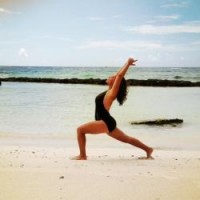Cultivating Self-Love in Difficult Poses
Half-way up into handstand and Boom! Your feet flip over your head.
The first thoughts that come to mind are defeating and condescending. I should have pressed firmer into my hands, I should have engaged my core more, I am not advanced, I can’t do anything. We’ve all been there one time or another.
This still happens to me with headstand in particular. The very thought of doing this pose causes a real uneasiness within. I feel headstand should not be a challenge for me at this point in my practice and I get frustrated, impatient. No matter how many times I try, shifting my perspective upside down is just as uncomfortable as the first attempt.
Our ego never fails in playing a role within our practice from time to time, if not constantly. Likewise, when you hold crow for longer than thirty seconds, your self-approval rating goes up and you are pleased, ending up with four stars so long as you come out with grace.
If this does not ever apply to you, you’re most likely in the minority and good for you for rising above your thoughts. It’s natural to give ourselves some criticism occasionally; it actually helps us to achieve our goals and keeps us wanting to try our best when it’s important.
What would it take to turn these little pests into our support system? In addition to telling them to go to hell, that is.
Whenever I feel agitation coming on while attempting an inversion or arm balance, I try and recognize this familiar feeling and let it pass just like a really bad idea. Another way may be to offer a supportive internal remark in place of that insult. A thought such as “You’ve got this, stick with it” will go much further than any negative cut down. We know this inside; the hard part is working it into our everyday lives.
Reward yourself just for showing up on the mat, which sometimes is not an easy feat in and of itself. Off the mat, journal and dig deep as to why you get discouraged in more difficult poses. Build self-esteem off the mat too, doing anything from maintaining good posture to reading cheesy, inspirational quotes. Most importantly, at the end of the day, of class, of the pose—don’t lose sight. If you are not breathing, if you are not aligned properly, if you can’t turn the voice off that isn’t serving you, back out and back off.
If you’re having trouble in a challenging pose, mentally or physically, go to where you were before you went too far. It’s not about a perfect Tittibasana anyway. For many asanas, you actually get the same benefits and are still working the major muscles of the pose by going through the steps to get there. Try to switch your focus from the end result and be present, which is the whole point of practice, right?


 Share on bsky
Share on bsky




Read 1 comment and reply